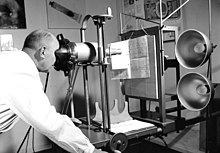
Back Ausweisfälschung German Falsification de papiers d'identité French شناختی دستاویزات میں دھاندلی Urdu 虚假证件 Chinese
This article needs additional citations for verification. (September 2019) |

Identity document forgery is the process by which identity documents issued by governing bodies are copied and/or modified by persons not authorized to create such documents or engage in such modifications, for the purpose of deceiving those who would view the documents about the identity or status of the bearer.[1] The term also encompasses the activity of acquiring identity documents from legitimate bodies by falsifying the required supporting documentation in order to create the desired identity.[2]
Identity documents differ from other credentials in that they are intended to be usable by only the person holding the card. Unlike other credentials, they may be used to restrict the activities of the holder as well as to expand them.
Documents that have been forged in this way include driver's licenses (historically forged or altered as an attempt to conceal the fact that persons desiring to purchase alcohol are under the legal drinking age); birth certificates and Social Security cards (likely used in identity theft schemes or to defraud the government); and passports (used to evade restrictions on entry into a particular country). At the beginning of 2010, there were 11 million stolen or lost passports listed in the global database of Interpol.[3]
Such falsified documents can be used for identity theft, age deception, illegal immigration, organized crime, and espionage.[4]
- ^ Buchanan, James D. R.; Cowburn, Russell P.; Jausovec, Ana-Vanessa; Petit, Dorothée; Seem, Peter; Xiong, Gang; Atkinson, Del; Fenton, Kate; Allwood, Dan A.; Bryan, Matthew T. (2005). "'Fingerprinting' documents and packaging". Nature. 436 (7050): 475. doi:10.1038/436475a. ISSN 1476-4687. PMID 16049465. S2CID 4164867.
- ^ Bennett, Colin John; Lyon, David (2008). Playing the Identity Card: Surveillance, Security and Identification in Global Perspective. Routledge. ISBN 9780415465632.
- ^ "11 million stolen or lost passports in Interpol database". Havocscope Black Markets.
- ^ Turner, J. W. Cecil (1946). ""Documents" in the Law of Forgery". Virginia Law Review. 32 (5): 939–954. doi:10.2307/1068683. ISSN 0042-6601. JSTOR 1068683.
© MMXXIII Rich X Search. We shall prevail. All rights reserved. Rich X Search